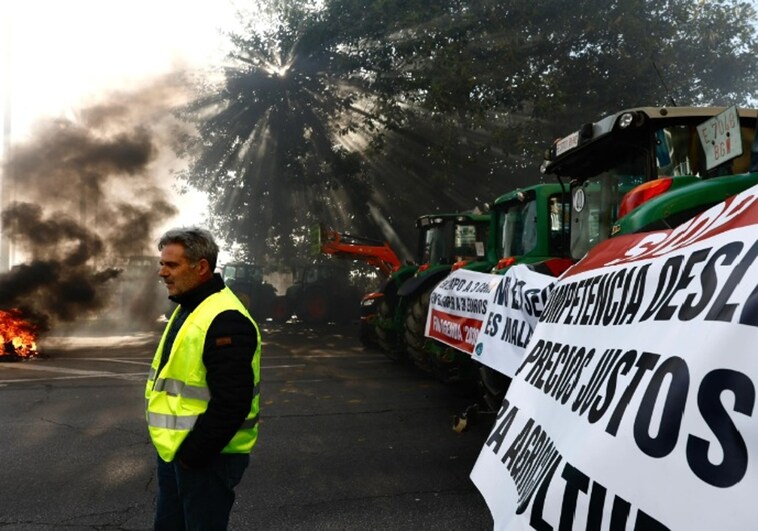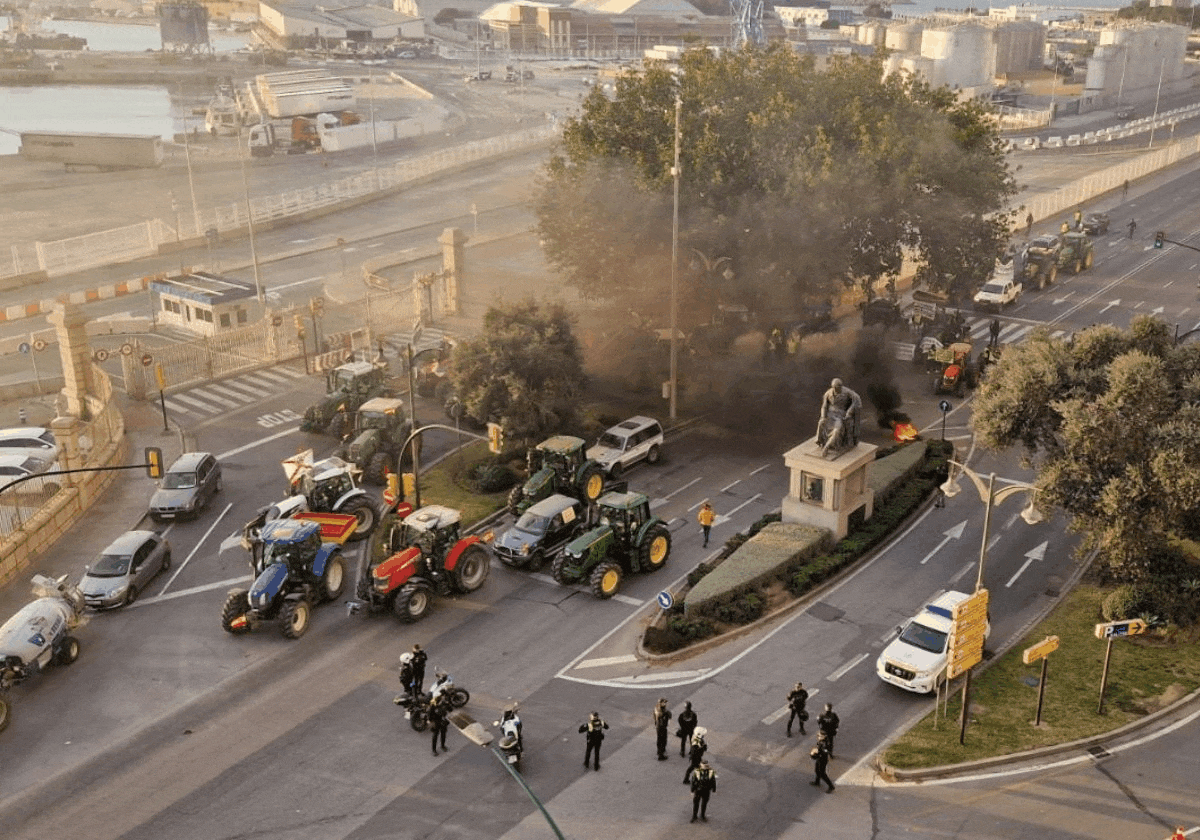
Farmers' protest winds down in city after huge demonstrations in Malaga, Antequera and Ronda
Organised in WhatsApp groups and outside the agricultural associations, the province's farmers are protesting against the European Union's agricultural policies
Matías Stuber
Malaga
Wednesday, 7 February 2024, 11:53
This Wednesday (7 February) dawned in Malaga city with the port still blockaded by tractors and numerous streets blocked, which motivated Local Police officers to redirect road traffic. But, at around nine o'clock, it was already beginning to be perceived among the farmers that even if there was the desire, it would not be possible to extend their protests and the tractors started heading towards the Guadalhorce industrial estate, escorted by National Police officers.
The intention was to hold out until Friday. But fatigue and the lack of reinforcements has taken its toll on the farmers who blocked access to the port and cut off the Paseo Marítimo Antonio Machado yesterday.
Farm vehicles blocked access to Malaga port on Tuesday from early in the morning, when tractors also halted lorries serving the Mercadona and Día logistics depots in Antequera.
In the spotlight were the European Union's agricultural policies, which are identified as the main culprits for the fact that small and medium-sized farmers are unable to make a living from their work in the fields. The spark of protests in other countries such as Germany, France and Belgium was slow to spread to Spain, but when it did, it resembled the spread of a large forest fire.
In Malaga on Tuesday, farmers from all corners of the province were mobilised. Unlike in the aforementioned neighbouring countries, they did so without the involvement of the main agricultural associations – Asaja, Unión de Pequeños Agricultores (UPA) and COAG – who could only watch as the WhatsApp-organised protests got under way on Monday night.
All corners of the province
They came from Teba, Almargen, Álora, Campillos, Alhaurín de la Torre, Alhaurín el Grande, Torrox, Ardales, Faraján, and elsewhere. After meeting at fuel stations, cooperatives or industrial estates, the tractors set off in the direction of Malaga, Antequera and Ronda. The protest made its mark in Ronda, but where it really made an impact was in Malaga city and Antequera.
Although the National Police were aware of the movements that were taking place and were monitoring the different WhatsApp groups as much as possible, they were unable to prevent the entry of some 200 tractors into Malaga. They advanced through the area of the Martín Carpena sports arena at around three o'clock in the morning and travelled along the entire coastal strip, passing through Sacaba, to park by Malaga port, in order to block the entrances on the Paseo Marítimo Antonio Machado and the Muelle Heredia. Once lined up one behind the other, forming a double row, the farmers set up pickets.
Some tyres and irrigation pipes were used to erect barricades. National Police and Guardia Civil officers began to arrive to monitor the next movements in situ. But the entrance to the port was already barred and the traffic was cut off before dawn.
The impact of the protest began to be felt first thing on Tuesday morning. With the Paseo Marítimo Antonio Machado partially closed in both directions, the Local Police had to divert cars towards Vialia, for those coming from the east, and in the direction of Juan XXIII for those coming from the Huelin area.
This impacted the main arteries of the city. Paseo del Parque, Alameda Principal and Avenida Valle-Inclán absorbed more and more cars. At best, traffic slowed down. Other roads such as Calle Córdoba, Alameda de Colón, and Avenida de Andalucí, suffered traffic jams at various times during the day.
Antequera
In parallel to these movements, lines of tractors were travelling along the national roads to reach the Antequera industrial estate. The farmers began to surround the main logistics platforms, including those of Mercadona and Día, and by the early hours of the morning they had blocked the access and exit of lorries. The actions were being shared live on different Whatsapp channels, which began to fill with messages of euphoria and jubilation. Several cooperatives in the province closed their doors as a sign of solidarity. Among them, those of Almargen, Humilladero and Campillos.
The protests also blocked the A-92 in both directions at Huétor-Tajar. The Malaga sub-delegate of the government, Javier Salas, said he understood the unease of the farmers, but recalled that these protests "had not been communicated in time and form". Mayor of Malaga, Francisco de la Torre, was critical of the protests. "It doesn't make sense for one part of the economy to annoy the rest," he said. A message that was not in tune with that of his party. The PP of Malaga even hung a banner in support of the farmers on the façade of its provincial headquarters, on Avenida de Andalucía. "Without farmers there is no food", it read.
What are they asking for? What are Spanish farmers marching against?
There are numerous answers and they are all related to the current agricultural policies emanating from Brussels and which the government applies. Amongst the demands voiced are those for greater control to prevent the entry of products from non-EU countries, compliance with the food chain law to prevent farmers having to sell below production costs, a reduction in bureaucracy and fewer phytosanitary requirements. "It can't be that they impose endless impositions on me and then the same product enters without these requirements from South Africa," said Sebastián Ramos, a lemon grower from the Guadalhorce Valley.
In Malaga, the blockade of the port continued throughout Tuesday. At around five o'clock in the afternoon, several tractors advanced along the Paseo de los Curas in an attempt to cut off the Paseo de la Farola. But National Police officers anticipated this and prevented the move. The impact on traffic was constant and was accentuated at peak hours. In Antequera, late in the afternoon, some tractors began to withdraw and some lorries were able to pass. However, the idea of the farmers is to organise themselves in shifts to keep the flame of the mobilisation alive.
The farmers consulted by SUR late on Tuesday confirmed that they would keep their tractors blocking the entrances to the Malaga port throughout the night, so everything pointed to a new day of protests on Wednesday. The city hall reported, on Tuesday night, that 51 of the 90 tractors which had prevented access to these installations were still in the area.
